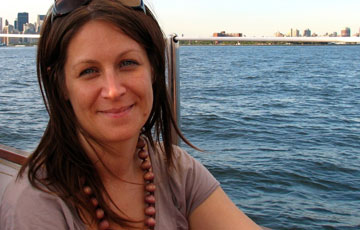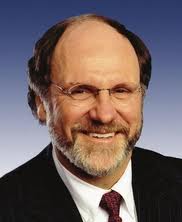I recently went suit-shopping. What a horrible experience, and not just because I don't like wearing suits and I didn't have a lot of money to spend on one. Spending hours in a department store, surrounded my literally thousands and thousands of garments, all priced in the hundreds and thousands (yes, really) of dollars, and not finding the one garment I needed to purchase, was totally depressing. One thing I noticed, though, was that everything I saw seemed really cheaply made. Whether the dress cost $200 or $2,000, an inspection of the tags inevitably revealed humble provenances behind the designer label: "Made in China/Bangladesh/Laos/Vietnam/some sweatshop somewhere that's too far away for you to contemplate too deeply."
In the middle of my renewed relationship with retail (I didn't have any spare time last semester to go to any stores), this new post on the Ms. blog entitled "If the Clothes Fit: A Feminist Takes on Fashion" came out. The title is somewhat misleading. I'm not sure what counts as "taking on" fashion, but while it provided some interesting history and made some obvious points about fashion being a signifier, I think the post failed to confront some of the more central issues about the fashion industry, and in particular, questions about labor practices, sourcing of materials, supply chains, etc. (I'm not going to even delve into the body image issue here. That's another post entirely.)
First of all, it helps to define what "fashion" is (the Ms. post doesn't.) For the purposes of discussion, I'll go with Merriam-Webster definition 3b:
b (1) : the prevailing style (as in dress) during a particular time (2) : a garment in such a style <always wears the latest fashions>
This definition, with the word "prevailing," implies notions of mass adoption, fleetingness ("during a particular time"), and to me, a certain coerciveness to either conform or be "out of fashion."
I make a distinction between "clothing," which I like, and "fashion," with its insistence on consumption and staying up-to-date. I like to sew (although I rarely make time for it), I love textiles, and I like getting dressed up for nice things. I like buying new things every now and then, and I like to buy things I think are nice - cozy sweaters, comfortable flip-flops, warm boots, pretty dresses, etc. In general, I buy something originally pretty expensive, at a drastically reduced sale price, a few times a year, and then I wear those items for years. It's been a long time - probably eight or nine years - since I bought something at a chain store like H&M or J. Crew.
I recently started thinking harder about my consumption practices as I reported my most recent story for Women in the World about three entrepreneurs who are making global trade work for women and artisans, two groups who have, particularly of late, not always benefited from the rise of free trade. One of the business owners I spoke to, Kavita Parmar, left the fashion houses she was designing for (I think DKNY or Donna Karan was one) in order to start a fair-trade clothing company that works closely with artisans in India and Italy and documents their faces and names so that each piece of clothing is attached to the person who makes them. Another, Farah Malik, seeks out disappearing craft traditions and preserves them by paying high-prices for extremely high-quality scarves that are woven, knitted or embroidered by skilled artisans in different post-conflict zones in eight countries.
Farah and I discussed the concept of "Slow Fashion," analogous to Slow Food, and why there was so much resistance to it within the fashion industry. Is it antithetical to an industry based on newness, on constant pressure to conform (to certain body types, say), on constant pressure to create, to knock off, to buy? Or is it, as Farah pointed out, that there is much less consumer awareness of supply chains, of labor practices, of sourcing within the fashion industry?
After our interview, I stopped by the farmer's market in Union Square to get some groceries. As I sorted through some produce, I chatted with the farmer about his growing practices, whether and when he sprayed his vegetables, etc. This kind of discussion is at the heart of conscious consumption, and while I find it perfectly normal within a food context, I realized I never have these conversations in stores. There are obvious reasons for that: unlike the farmer, who did the spraying himself, the salesperson at a New York branch of J. Crew likely won't know which exact dodgy Guangzhou factory that $39 shirt was made in. But I'm surprised there is very little discussion of this outside of the anti-sweatshop movement. Is it because we don't ingest our clothing, so we assume it's not important to know where it came from? Why demand a little more transparency? Why not put questions to a clothing brand about its manufacturing process? Aren't you curious?
Or do we not want to know?



